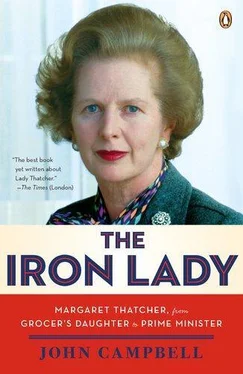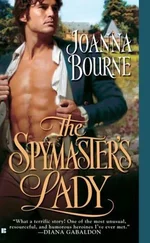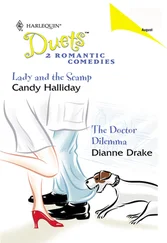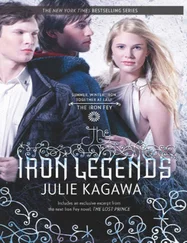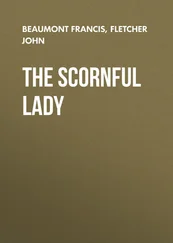By far the most important thing she did in her first term was to join the Oxford Union Conservative Association (OUCA). There was no question of her joining any other party, or all the political clubs, as some new undergraduates did. She had no doubt of her allegiance; Winston Churchill was her hero and she already took her political commitment very seriously.
To Janet Vaughan, Principal of Somerville and proud of the college’s left-wing reputation, Miss Roberts was an embarrassment, a cuckoo in her progressive nest.
She fascinated me. I used to talk to her a great deal; she was an oddity. Why? She was a Conservative. She stood out. Somerville had always been a radical establishment and there weren’t many Conservatives about then. We used to argue about politics; she was so set in steel as a Conservative. She just had this one line… We used to entertain a good deal at weekends, but she didn’t get invited. She had nothing to contribute, you see. 26
It would be hard to overestimate the effect of this sort of snobbish condescension on the formation of Margaret Thatcher’s character. The discovery that all the trendy people were against her only confirmed her certainty that they were all wrong and reinforced her righteous sense of persecution. She encountered the same patronising attitude when she first became Leader of the Opposition in 1975. She had probably met it already at school, where she was used to being a loner who was not allowed to go to dances: it was precisely the attitude Alfred had tried to arm her against by urging her to follow her own – or his – convictions and ignore the crowd. But nowhere can it have been more brutal than at Oxford, where she went up naively expecting to find rational inquiry but met only arrogant superiority. This was her first encounter with the liberal establishment and she did not like it. It hardened her heart: one day she would get even.
Miss Roberts made her first recorded political speech during the 1945 General Election. As soon as the term ended she went back to Grantham to work for the Conservative who was trying to regain the seat from Denis Kendall – an Independent who had won it at a by-election during the war. The new candidate was Squadron Leader Worth. The twin themes of his campaign were encapsulated in an advertisement in the Grantham Journal : ‘Worth stands for Agriculture and Churchill.’ 27Margaret Roberts, still only nineteen, acted as warm-up speaker at meetings before the Squadron Leader arrived. At one such meeting on 25 June, the Sleaford Gazette reported, ‘the very youthful Miss M. H. Roberts, daughter of Alderman A. Roberts of Grantham’, did not talk about agriculture, but spoke with precocious confidence about the need to punish Germany, to cooperate with both the Soviet Union and the United States, and to ‘stand by the Empire’ – as well as the importance of confirming Churchill in power. Having lost Roosevelt, she urged, the world could not afford to lose Churchill too. 28
If she expected Kendall to lose and Churchill to be returned, however, she was wrong on both counts. Kendall held Grantham by a huge majority while the Conservative Government was swept from office by a totally unanticipated Labour landslide. Miss Roberts was shocked by the result. ‘I simply could not understand how the electorate could do this to Churchill,’ she wrote. 29She was still more shocked to find that others whom she had assumed to be right-thinking Conservatives were not equally dismayed but elated by the election of a Labour Government. She always had difficulty believing that otherwise decent people could genuinely hold opposite opinions to her own. Looking back over half a century she portrayed the 1945 election as the start of the rot which did not begin to be set right until she herself was elected in 1979.
Returning to Oxford for her third year she found a university transformed by returning servicemen, older than normal peacetime undergraduates, keen both to build a new world and to celebrate their own survival. Lady Thatcher claims to have enjoyed the seriousness of the new influx; but she also allowed herself to unbend slightly and enjoy a little of the new hedonism. ‘It was at this time’, she wrote in The Path to Power , ‘that I first went out to dances and even on occasion drank a little wine.’ 30She tried smoking, did not like it and decided to spend her money buying The Times every day instead. She went to the theatre. But she was not, so far as we know, tempted to act: nor did she develop any lasting interest in the theatre. What she did discover was a love of ballroom dancing, a taste which stayed with her, though rarely indulged, all her life.
But who did she dance with? There is no record that she had any serious male friends at Oxford, let alone a boyfriend. The fact is that her social life was wholly subordinated to politics. By her third year, despite competition from the returning servicemen, she was senior enough to stand for office within OUCA. She was first elected to be Secretary, in which capacity she attended a Conservative student conference in London; then Treasurer in the summer term; and finally President in Michaelmas 1946, when she went back to Oxford for a fourth year to take her B.Sc.
In her memoirs Lady Thatcher described her time at Oxford as an important period of intellectual foundation-building. Yet the only books she specifically mentions having read are Friedrich Hayek’s The Road to Serfdom , which was first published in 1944, and Who are ‘The People’? by the anti-socialist journalist Colm Brogan, published in 1943. Reading chemistry for her degree, rather than history or PPE (politics, philosophy and economics) like most aspiring politicians, she was not exposed to the discipline of sampling the whole spectrum of political thought; she was free to read only what she was likely to agree with. But if she did read The Road to Serfdom at this time, she also read Keynes’ seminal White Paper on Full Employment, published the same year. Many years later she produced a heavily annotated copy from her handbag to berate the young Tony Blair in the House of Commons. 31She made very little acknowledgement of Hayek’s influence over the next thirty years. But this is not surprising: she was always a gut politician, to whom intellectual arguments were no more than useful reinforcement. It is only retrospectively that she would like to claim an intellectual pedigree that was no part of her essential motivation.
Then, in early October 1946, she attended her first party conference, at Blackpool. She loved it. One of the sources of Mrs Thatcher’s strength in the 1980s was that – almost uniquely among Tory leaders – she was in tune with ordinary party members. That love affair began at Blackpool. Now she met for the first time the Tory rank and file en masse already reacting defiantly to the outrageous impositions of socialism. She was impressed by the sheer number of the representatives, disproving any idea that Conservatism was an extinct creed, and she felt that she was one of them.
From now on she was on the inside track. No one she met at Oxford directly helped her or advanced her career; but having been President of OUCA gave her a standing at Central Office which helped her on to the candidates’ list. What Oxford did not give her was a liberal education. She did not mix very widely or open herself to new views or experiences. She arrived in Oxford with her political views already settled and spent four years diligently confirming them. Undoubtedly her scientific training gave her a clarity and practicality of thought very different from the wishful woolliness of much arts and social science thinking. At the same time she read little or no history at university; and neither then nor later did she read much literature.
Читать дальше
